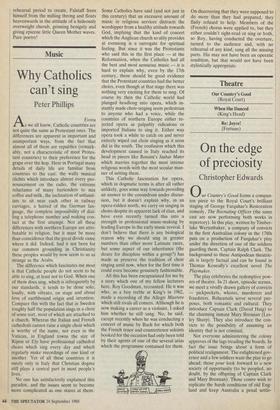Music
Why Catholics can't sing
Peter Phillips
AEvora
s we all know, Catholic countries are not quite the same as Protestant ones. The differences are apparent in important and unimportant ways, from the fact that almost all of them are republics (remark- ably, not a characteristic of most Protes- tant countries) to their preference for the grape over the hop. Here in Portugal many details of daily life are familiar from countries to the east: the wally musical clichds which introduce almost every pro- nouncement on the radio, the extreme reluctance of many bartenders to mix coffee and milk, the inclination of unfamil- iars to sit near each other in railway carriages, a hatred of the German lan- guage, the complete impossibility of dial- ling a telephone number and making con- tact at the first attempt. Not all these differences with northern Europe are attri- butable to religion, but it must be more than coincidence that the great divide came where it did. Indeed, had it not been for our common grounding in Christianity these peoples would by now seem to us as strange as the Arabs.
The difference which fascinates me most is that Catholic people do not seem to be able to sing, at least not to God. When one of them does sing, which is infrequently by our standards, it tends to be done solo, loudly, with vibrato, on stage and about love of earthbound origin and intention. Compare this with the fact that in Sweden roughly half the population sings in a choir of some sort, most of which are attached to a church. Whereas the Italian and French cathedrals cannot raise a single choir which is worthy of the name, not even in the Vatican, in England towns the size of Ripon or Ely have professional cathedral choirs which sing every day and which regularly make recordings of one kind or another. Yet of all these countries it is surely only in Italy that Christian dogma still plays a central part in most people's lives.
No one has satisfactorily explained this paradox, and the issues seem to become more complicated as one stares at them.
Some Catholics have said (and not just in this century) that an excessive amount of music in religious services distracts the worshipper from a healthy attitude towards God, implying that the kind of concert which the Anglican church so ably provides at evensong is a surrogate for spiritual feeling. But since it was the Protestants who said this in the first place — at the Reformation, when the Catholics had all the best and most sensuous music — it is hard to explain why, even by the 17th century, there should be good evidence that the Protestant countries had the better choirs, even though at that stage there was nothing very exciting for them to sing. Of course by then the Catholic world had plunged headlong into opera, which in stantly made choir-singing seem pedestrian to anyone who had a voice, while the countries of northern Europe either re- jected opera as palpably ridiculous or imported Italians to sing it. Either way opera took a while to catch on and never entirely wiped out choir singing as it soon did in the south. The confusion which this development caused in Italy reached its head in pieces like Rossini's Stabat Mater which marries together the most intense religious words with the most secular man- ner of setting them.
This Catholic fascination for opera, which in dogmatic terms is after all rather unlikely, goes some way towards providing an answer to the conundrum under discus- sion, but it doesn't explain why, in an opera-ridden north, we carry on singing in choirs despite its apparent lack of élan, and have even recently turned this into a strength in professional music-making by leading Europe in the early music revival. I don't believe that there is any biological reason why we should sing in greater numbers than other more Latinate races, but some aspect of our inheritance (the desire for discipline within a group?) has made us preserve the tradition of choir singing until now, when for the first time it could even become genuinely fashionable.
All this has been encapsulated for me by a story which one of my fellow lecturers here, Roy Goodman, recounted. He it was who, as a boy treble at King's in 1962, made a recording of the Allegri Miserere which still rivals all corners. Although he is now making a career as a violinist, I asked him whether he still sang. No, he said, except recently when he was conducting a concert of music by Bach for which both the French tenor and countertenor soloists booked for the occasion had only been told by their agents of one of the several arias which the programme contained for them.
On discovering that they were supposed to do more than they had prepared, they flatly refused to help. Members of the (French) chorus were applied to, but they either couldn't sight-read or sing or both, so Roy, having conducted the overture, turned to the audience and, with no rehearsal of any kind, sang all the missing parts. His may not have been an operatic rendition, but that would not have been stylistically appropriate.






























































 Previous page
Previous page